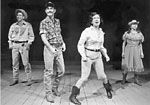The myths of the Old West may look to be a pretty clich餠and outdated collection of tales to base our national psyche on, with their racist and sexist stereotypes and their inflated machismo of quick-drawing lawmen and dangerous desperados. But as playwright Louis Broome is well aware, they still remain a potent prism through which to view the lives of ourselves and our parents, and as his new tragicomedy Texarkana Waltz demonstrates, they’re as useful as any other mythic frame of reference for dealing with the irrational and inexplicable roots of human behavior.
Texarkana Waltz
Empty Space Theater till February 13
Eddie (Burton Curtis) and Emma (Lauren Weedman) are deeply in love, and to their children Houston (Paul Morgan Stetler) and Dallas (Jen᠃ane), life seems as perfect and pristine as their mother’s starched blouse. Though the family’s poor and the Oklahoma farm they work has near-barren soil, there’s absolutely no reason for anything bad to happen to them. But it does, in the most horrific way imaginable. Drunk one night, Eddie stabs Emma to death before their children’s eyes. Now, 20 years later, Houston is in a semi-catatonic state in an Oklahoma mental hospital, and Dallas has fled her Southwest origins to end up in Seattle, where she’s watching yet another relationship, with her girlfriend Morgan (Weedman again), disintegrate.
The story that results is of the two separate quests that Eddie and Emma’s children make, along with an extensive flashback to the last night in the life of Eddie before his execution. Dallas’ journey is first to take charge of her brother, then to find a final resting place for her mother’s ashes, while Houston is involved in an imaginary quest with his childhood hero, Cowboy Bob (Todd Beadle, who reappears as Father Bob, Warden Bob, and a couple of other authority figures). Houston’s fantasy world of rustlers, sheriffs, and quick-draw lessons is soon given a new direction: Like Hamlet, he’s called to avenge his slain parent’s shade, and in his fantasy is searching for a final showdown with his own father.
Broome’s deft writing walks a careful line between cowboy camp and real-world tragedy, and is perfectly suited to one-time Seattle director Alison Narver, who responds to this melancholic comedy with her customary directorial precision. Like an old cowboy ballad, there’s something both patently artificial and yet undeniably affecting in such moments as Eddie’s final interviews with his parents, a preacher, and in a moment of surreal brilliance, old Cowboy Bob himself. (It doesn’t hurt that between Nathan Anderson on guitar and Edd Key on various other instruments, the show boasts a musical score so tight you could bounce campfire biscuits off it.)
Narver’s blessed with a first-rate cast, with Curtis’ forlorn Eddie the undeniable focus of our attention, Stetler particularly good at shifts between mental case and Saturday matinee cowboy, and Keri Healey as Eddie’s mother giving two wonderful portraits of a terminally disappointed woman at 20-year intervals. Beadle’s various Bobs are each notably different yet strangely linked, and his casual saunter as he muses about life on the prairie would do Randolph Scott proud.
A few minor problems surface here and there. Broome’s script needs not so much a rewriting as a reshuffling, and while both Cane and Weedman are characteristically strong, we’re given less information about their relationship than we require, while we learn perhaps more about Eddie’s father (Paul Niebank) than is needed. At times he also strives too consciously to emulate his Shakespearean inspiration with cowboy poetry, when his own narrative voice is far more confident and sure-footed.
But overall this is a script and a production that draws considerable power from an unlikely source and, like the waltz which gives the show its title, is a lyrical dance that celebrates life and love with a sad, nostalgic air.








